Content
- In what form of release are drugs used to treat chronic pancreatitis?
- What groups of medicines can be used for pancreatitis
- Antispasmodics
- Enzymes and antienzyme drugs
- Antacids
- Antisecretory drugs
- H2 blockers
- Proton pump inhibitors
- Other medicines for pancreatitis for symptomatic treatment
- Antibiotics
- Vitamins
- Anti-inflammatory drugs
- Iron preparations
- Medicines to restore intestinal microflora
- For plasmapheresis
- Can you drink choleretic drugs?
- How to cope with an acute attack of chronic pancreatitis?
- How to choose the right medicine for pancreatitis
- Features of taking medications for pancreatitis
- Complications after taking medication
- How long does the medication take?
- Can pancreatitis be cured with drugs forever?
- Chronic pancreatitis treatment video
Chronic pancreatitis Is an inflammatory process that occurs in the pancreas and is characterized by insufficient production of enzymes. The main way to treat the disease is to take medications of various groups.
In what form of release are drugs used to treat chronic pancreatitis?
There are several dosage forms of drugs. In most cases, oral forms are used - capsules, tablets, pills. Various powders can also be used, including suspension concentrates.
In severe forms of pathology, medicinal solutions for injections (infusions) are used:
| Dosage form | pros | Minuses |
| Tablets (capsules, pills) |
|
|
| Suspensions, lyophilisate |
|
|
| Solutions, infusion |
|
|
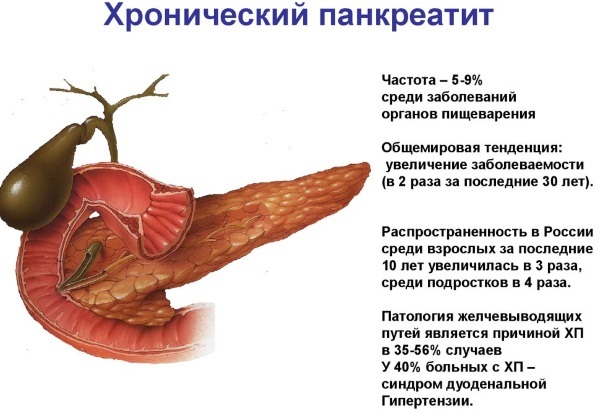
One or another dosage form is selected based on the possibility of its use, the severity of the disease and other physiological characteristics of the patient.
What groups of medicines can be used for pancreatitis
Medication therapy is selected individually. A whole complex of drugs is prescribed depending on the reasons that led to the development of the disease.
Antispasmodics
Treatment of chronic pancreatitis with medications should begin with the intake of basic drugs that help eliminate discomfort and other associated symptoms. First of all, antispasmodic drugs are prescribed.
This group of funds is used to eliminate pain and relieve spasms in smooth muscles. However, medications are not recommended for pain caused by the pressure of neoplasms (cysts, pseudocysts) or stones formed in the bile ducts.
Preparations:
- Drotaverinum.
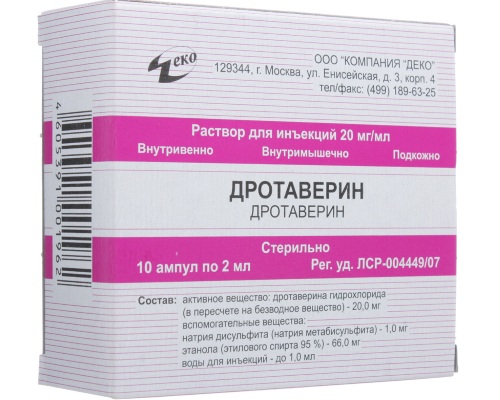
The drug Drotaverin is used in the treatment of chronic pancreatitis - Atropine.
- Papaverine.
- Mebeverin (Duspatalin).
- Pinaveria bromide.
In most cases, parenteral forms of drugs are used, which are administered intravenously or intramuscularly.
Enzymes and antienzyme drugs
The disease is characterized by insufficient production of its own enzymes. Therefore, drugs containing enzymes are prescribed as replacement therapy.
The funds are divided into medicines of plant and animal origin. The most commonly prescribed drugs are Simethicone, Himopapain, Hemicellulase. These medications should only be taken with food.
In acute conditions, enzymes accumulate in excess, therefore, antienzyme agents are used that contribute to the elimination of excess substances.
This group includes medicines containing aprotinin (active ingredient) - Gordox, Ingitril, Aprotex.
Antacids
The action of this group of drugs is aimed at reducing the excessive production of hydrochloric acid in the stomach. Antacids have a cytoprotective, adsorbing, enveloping and neutralizing effect. Often, drugs are used in combination therapy with enzymes, which makes it possible to enhance the effect of the latter.
The most effective are medicines containing an aluminum cation. This substance exhibits the highest therapeutic effect in comparison with other components.
List of funds:
- Almagel.
- Maalox.
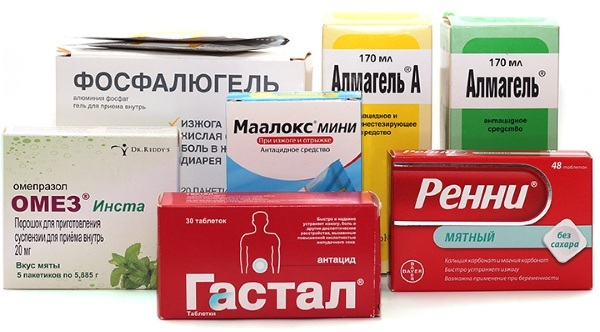
- Rennie.
- Phosphalugel.
- Egilok.
When prescribing drugs, preference is given to suspensions, since the absorption capacity of this dosage form is better than that of capsules.
Antisecretory drugs
Treatment of chronic pancreatitis with medicines in the overwhelming majority of cases is carried out in a comprehensive manner. Antisecretory drugs are also mandatory.
These funds are used to reduce the production of hydrochloric acid. Moreover, they have a pronounced cytoprotective effect and enhance the production of protective mucus. The drugs also increase blood flow to internal organs and accelerate scar healing.
H2 blockers
These drugs reduce the amount of hydrochloric acid produced and have an antihistamine effect, thus enhancing the function of various glands.
These include:
- Cimetidine.
- Ranitidine.
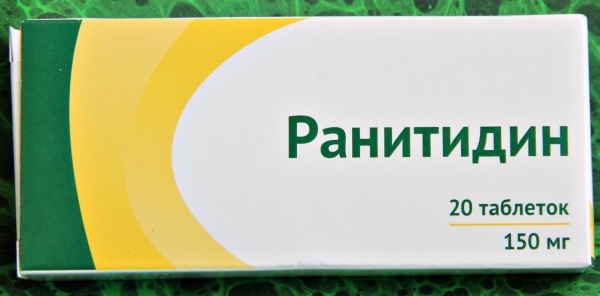
Ranitidine - Roxatidine.
Medicines also protect enzyme-containing agents from the destruction that can occur under the influence of excess production of hydrochloric acid.
Proton pump inhibitors
Medicines of this group (PPI) are prescribed to suppress the activity of the proton pump, which leads to a decrease in the acidity of gastric juice and a decrease in the production of hydrochloric acid.
The most commonly prescribed drugs are benzimidazole derivatives:
- Omeprazole.
- Pantoprazole.
- Lansoprazole.
- Helol.
The recommended dosage form is capsules. Reception time - preferably in the morning before breakfast.
Other medicines for pancreatitis for symptomatic treatment
In addition to essential medications, additional medications may be prescribed as symptomatic therapy. This or that remedy is selected in each case separately.
Antibiotics
Antibacterial drugs are prescribed in order to avoid the development of complications, as well as already with the existing bacterial lesion of the body. They prevent the occurrence of sepsis, abscesses, necrosis. It is taken in short courses from 1 to 2 weeks.
Group representatives:
- Fluoroquinolones.
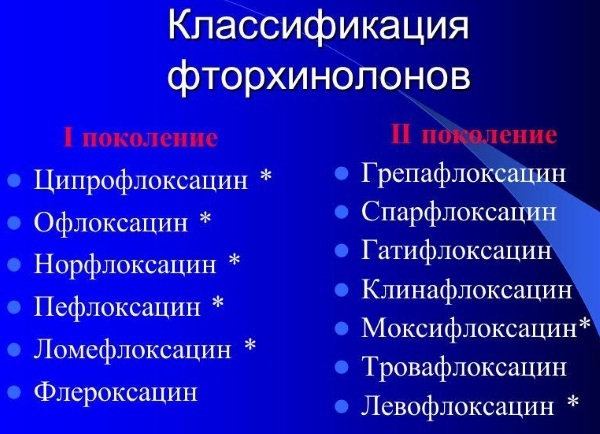
- Cephalosporins.
- Carbapemen.
- Metronidazole.
The recommended dosage form is injections. For mild disorders, capsules are the preferred dosage form.
Vitamins
Functional digestive disorders in most cases are accompanied by a deficiency of vitamins, therefore, vitamin-containing agents are used as a supplement.
Preparations are selected after diagnostics, which allows you to determine which vitamin is missing. The most commonly used fat-soluble vitamins are A, D, E, and K.
In combination with enzymes, the agents reduce the risk of developing malignant tumors in the pancreas.
Immunomodulators can also be used, the action of which is aimed at preventing the development and spread of infections and other complications. At the same time, they make it possible to increase the body's resistance to the underlying disease and achieve stable remission.
Anti-inflammatory drugs
In most cases, NSAIDs (non-steroidal anti-inflammatory drugs) are used. This group of drugs helps to eliminate inflammatory processes in the pancreas, and also relieve pain.
Preparations:
- Diclofenac.
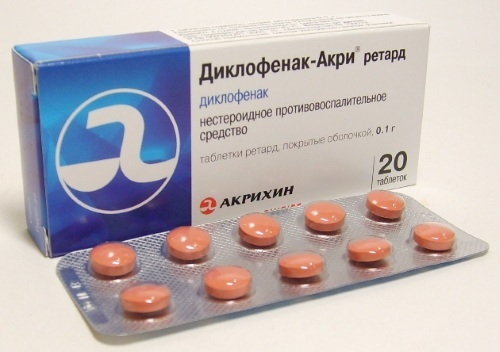
- Piroxicam.
- Meloxicam.
- Metamizole sodium.
The use of non-steroidal anti-inflammatory drugs avoids complications in the form of peritonitis, abscess, sepsis, pancreatic necrosis.
Iron preparations
These medicines are used individually, based on the intake of other medicines (enzymes). In some cases, during enzyme therapy in patients, there is a deterioration in iron absorption, therefore, it is necessary to restore the normal level of the trace element.
In some cases, iron supplements are prescribed to restore carbohydrate metabolism. This feature was noted in patients who have recently undergone surgery to the pancreas.
Class representatives: Maltofer, Totema, Ferlatum.
Medicines to restore intestinal microflora
The chronic course of pancreatitis requires the constant use of a large variety of medications. As a result of long-term treatment, the human immune system gradually weakens, which is a good opportunity for the development of various additional disorders.
Restoration of intestinal microflora is necessary after prolonged use of potent drugs (antibiotics), since their systematic use leads to a violation of the ratio of beneficial and pathogenic microorganisms. This, in turn, can lead to various complications, including dysbiosis.
In most cases, bifidobacteria or lactobacilli are prescribed:
- Bifidumbacterin.
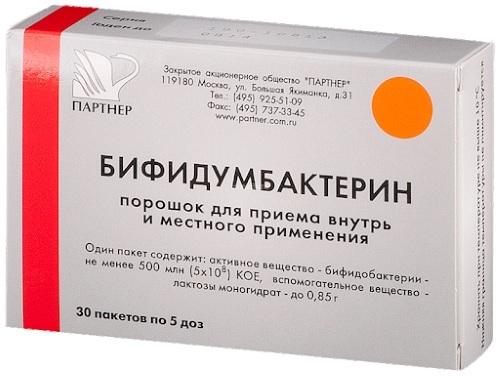
- Lactobacterin.
- Lactofiltrum.
Take medications before meals. The duration of the application is from 2 to 3 weeks.
For plasmapheresis
Plasmapheresis (hemocorrection) is a medical procedure aimed at purifying the blood from various substances - toxins, inflammatory mediators, unnecessary antibodies, high molecular weight lipids.
The essence of the technique is to cleanse the plasma using special equipment and infuse the purified blood back into the body. This type of therapy can be used for various diseases, accompanied by the formation and deposition of toxins and other harmful substances.
Preparations for the procedure are selected individually by the attending specialist.
Can you drink choleretic drugs?
Medicines with a choleretic effect can be prescribed for chronic disease. However, only in the absence of exacerbations in remission.
This is necessary to achieve the following results:
- elimination of stagnation of bile;
- decrease in secretory load;
- normalization of digestive functions;
- elimination of edema;
- reducing pressure on neighboring organs.
The drugs should be taken only on the advice of a doctor and under his strict supervision. It should also be borne in mind that drugs of this group are contraindicated in the presence of gallstone disease.
How to cope with an acute attack of chronic pancreatitis?
In an acute attack of the disease, it is recommended to follow certain rules that will help reduce pain and prevent the development of severe conditions.
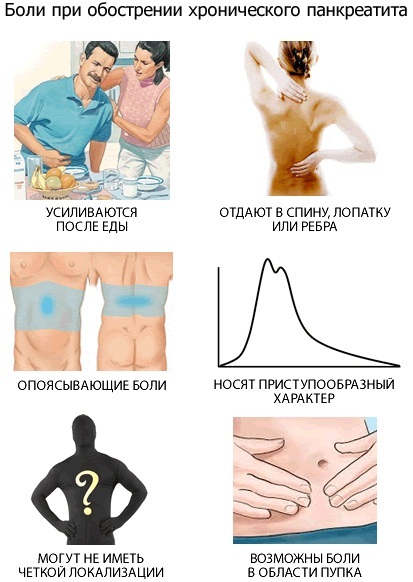
Recommendations:
- Refusal to eat and drink. It is allowed to use clean water.
- Take a horizontal position. When vomiting, you need to lie on one side and press your knees to your chest.
- Fill a heating pad with cold water and apply to the painful area.
Additionally, you can take an anesthetic drug. In this case, analgesics are allowed to be taken only with the permission of a doctor.
In more severe cases, call for medical attention.
How to choose the right medicine for pancreatitis
It is possible to take medications for illness only with the permission of the attending physician and strictly in accordance with the rules specified in the instructions. It is not recommended to prescribe funds on your own, since an incorrectly selected drug can lead to an aggravation of the patient's condition.
The duration of the course, dosages are also established by a specialist in each case separately, based on the form, severity of the disease and tolerance of drugs.
The patient's ability to take one or another form of the drug is also taken into account:
- Seriously ill patients are prescribed injection or infusion administration of funds.
- With a mild course of the disease, as well as children, it is recommended to take oral forms of drugs (preferably suspensions).
Features of taking medications for pancreatitis
Treatment of chronic pancreatitis with medications requires the correct selection of drugs, because it is wrong the chosen treatment regimen can lead to a complete lack of result or provoke an aggravation of the course disease.
The drugs are selected based on the patient's condition, the form and severity of the pathological process. Moreover, all funds are assigned only after the necessary research has been carried out.
The selection of medicines is carried out by the attending physician based on the physiological characteristics of the patient, the tolerance of the components, the presence of additional complications or concomitant diseases. In this regard, it is recommended to inform the specialist in advance about possible existing diseases, which will avoid complications.
Complications after taking medication
Drug therapy can provoke the development of various complications, so all funds should be taken in accordance with the recommendations of the attending physician.
Possible complications:
- Antibacterial agents: impaired digestive functions.
- NSAIDs: malfunctions of the gastrointestinal tract, disorders of the cardiovascular system.
- Enzymes: allergic reactions, iron deficiency in the body.
- Antisecretory drugs: pseudosyndrome (withdrawal syndrome), heartburn, pain in the chest area.
Uncontrolled medication can worsen the patient's condition and cause an attack.
How long does the medication take?
Treatment of chronic pancreatitis with medications, as well as the duration of therapy, depends on many different factors and is established by the attending specialist. This takes into account the general condition of the patient, the severity of the disease, as well as previous surgical interventions.
With a mild course of the disease, the duration of the use of drugs varies from 3 to 5 days. Antibiotic therapy can be continued for 1 to 2 weeks.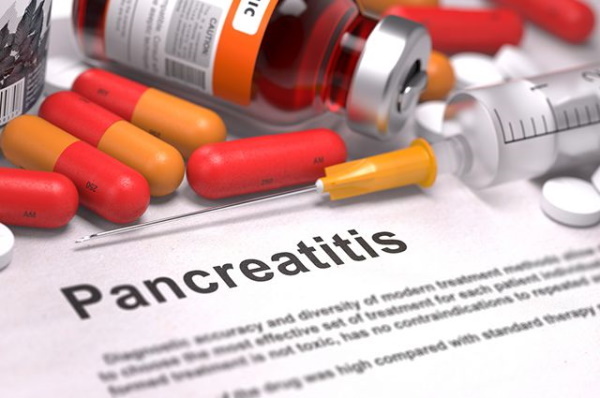
The duration of replacement (enzyme) therapy is several months, usually from 2 to 3 months.
Can pancreatitis be cured with drugs forever?
The possibility of a complete clinical cure depends on the severity of the pathology, as well as on the reasons that provoked its development.
With a mild course of the disease caused by excessive consumption of alcoholic beverages or fatty foods, there is a high probability of its complete elimination.
In the presence of additional complications (inflammatory reactions, neoplasms, gallstone disease), the chances of recovery are reduced. This requires additional symptomatic therapy.
In severe cases, as well as in the presence of various formations (tumors, cysts), drugs are used as an auxiliary treatment. With these complications, surgical intervention is recommended.
With structural changes in the organ (necrosis), there is practically no possibility of clinical cure. In this case, constant supportive therapy is carried out, dietary food is prescribed. As a supplement, it is recommended to engage in physical exercises that will help restore metabolic processes in the body and strengthen the immune system.
Chronic pancreatitis requires constant monitoring by the attending physician and compliance with all the rules prescribed by him, including the mandatory intake of medications. Only in this case can you achieve a stable remission or get rid of the disease forever.
Chronic pancreatitis treatment video
Malysheva will tell you how to treat chronic pancreatitis:



